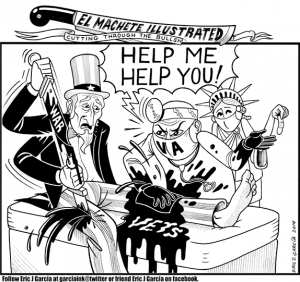Voices RSS feed for this section
Emerging Voices: Amanda Custer
Curator's note by Stevie Olson: This week, the Mercury is excited to publish two poems by Amanda Custer. Both pieces explore Amanda’s experience of living with a grandmother who has Alzheimer’s. Her language is full of engaging imagery, and both poems use beautiful progressions to harness the reader’s emotions. We hope you enjoy...
Continue reading...Digital Art with a North/South Consciousness
02. July 2014
The Digital Latin America Symposium, produced by 516 ARTS in Albuquerque, New Mexico June 7-8, 2014 at the Albuquerque Museum of Art and History, drew creative minds from local communities and diverse places in Latin America. The audience was composed of academics, artists, journalists, community organizers and enthusiasts. 516 ARTS brought together world-renowned artists like Pablo Helguera and Alex Rivera, as well as showcasing talented young artists who bring new concepts and processes to artmaking. This event showed an understanding of the transnational connection that exists between peoples of the Southwest region of the US to peoples, culture and art in Latin America...
Continue reading...El Machete: Preventative Medicine
29. June 2014

Preventative Medicine
Continue reading...Tongues of Fire on the Border
27. June 2014
With the defeat of Eric Cantor, immigration reform may be dead for the near future. Nonetheless, there are heroes out there who won’t be deterred by Congressional dysfunction. One of them is Reverend John Fife who was recently in Santa Fe.
Back in the early 1980s when wars were raging in Central America, refugees fled to the United States from death squads in their home countries, particularly Guatemala and El Salvador. The first church to respond to this crisis was Fife’s church, the Southside Presbyterian church in Tucson, Arizona. On March 24, 1982 he started the Sanctuary movement and initiated an “underground railroad “system to move refugees to other parts of the country and to Canada where they would be safe...
Continue reading...Immigrants or Refugees?
27. June 2014
In the media barrage over the “flood” of Central American children arriving along the United States’ southern border, the refuge-seekers have been typically labeled as “illegal immigrants” by many media outlets.
But Central American migrant advocates have a diametrically opposed take on the crisis, contending that the children on the U.S. border should be considered not as immigrants but refugees meriting international treatment standards, which does not generally include detaining children, according to Human Rights Watch...
Continue reading...Five Questions with New Mexico Authors - Tanya Ward Goodman
26. June 2014
This week we ask author Tanya Ward Goodman some questions about the creative genius of her father, Ross Ward, about the cascading impact on her family of his early on-set Alzheimer’s disease, and about her superbly crafted and deeply moving memoir Leaving Tinkertown from UNM Press, 2014.
NNM: Your storytelling power has made Leaving Tinkertown one of those books readers return to, savor, and use to help understand their own lives. We wondered what access the book has given you to other families and healthcare communities who’ve experienced both the torments of early onset Alzheimer’s disease and are working to find a treatment that works?
TWG: Since the book came out there have been so many opportunities to meet people in the Alzheimer’s community...
Continue reading...Weekly Poem: Hot Tub Time Machine
25. June 2014
There’s a place
just beyond the present,
where the past goes to die
in the name of progress.
Where prayers
become quaint folks songs,
instead of blueprints,
instead of sheet music to the revolution,
instead of the past words
to our next donut round the sun...
Emerging Voices: Elijah Bekaye
25. June 2014
Curator's note by Stevie Olson: This week, Elijah Bekaye shares two poems. The first piece, “How It Feels,” explores feelings of isolation and loneliness. Elijah’s carefully crafts this piece to bring the reader on an emotional journey. “To: The Reader,” the second poem, offers gentle encouragement with touches of wisdom. With the poem’s clever punctuation, it deserves the reader’s full attention and a second read--it is, after all, addressed to you. Elijah, thank you for your piece. We wish you well this summer and beyond...
Continue reading...Marx, Freud and Mitt Romney: What Globalization Means
24. June 2014
Taxation Without Representation!
That was the clarion call the American colonists employed to rouse their fellows against the British in 1776. The American Colonies were important for the nascent capitalist economy in England, because they represented not only a growing market for their goods (tea was only one of many products exported to America), but also a new source of natural resources to bring back to the homeland and turn into goods to be sold back to the colonists. The British had already monopolized tea imports from China and were reaping fortunes selling it, not only in their own country but to the American colonists as well.
My point is that capitalism has always been in search of new, expanding markets...
Continue reading...Ten Reasons Why People Are Not Concerned About the Kirtland Jet Fuel Spill
23. June 2014
In August 2013 the NM Mercury published an article of mine entitled “Why Aren’t More People in Albuquerque Concerned about the Kirtland Jet Fuel Spill?” After working on issues related to the spill for the past 10 months, I now know much more about the spill itself and have a much better idea about why most people in Albuquerque are not particularly concerned about this major threat to our drinking water.
Here are the top ten reasons...
Continue reading...

03. July 2014
1 Comment